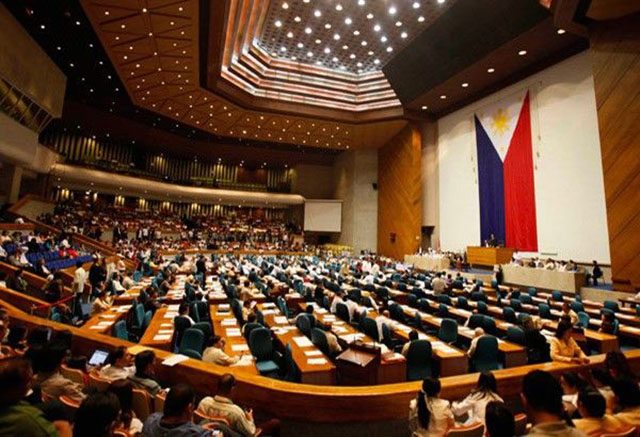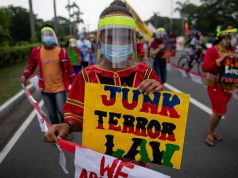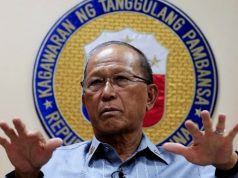Some lawmakers withdrew their co-authorship of the controversial anti-terror bill as online calls to scrap it continue to dominate local Twitter.
Hashtag #JunkTerrorbill reached over 800,000 tweets on Wednesday evening after the House Bill 6875 or the Anti-Terrorism Act of 2020 was approved by the House of Representatives on third and final reading. It earned 173 affirmative votes, 31 negative and 29 abstentions.
The bill was sent to President Rodrigo Duterte‘s desk and is now up for his signature, just days after he certified it as urgent.
Since the Senate’s approval of their version last February, online calls using the hashtags #junkterrorbill and #junkterrorbillnow have circulated around social media to call out lawmakers to scrap it.
Some news organizations reported that Deputy Minority Leader Carlos Zarate (Bayan Muna Party-list), who was among those who voted no to the bill, was muted during the virtual deliberations.
THIS IS ALARMING!
"Deputy Minority Leader Carlos Zarate, who voted no, tells secretariat other congs joining the session through Zoom were muted and were not able to say their no vote."#JUNKTERRORBILLNOW
— #SaveLumadSchools (@maykamaykaba) June 3, 2020
Harap-harapan tayong niloloko ng mga ito. ANG SASAHOL. #JUNKTERRORBILL #JUNKTERRORBILLNOW https://t.co/NC2byNl210 pic.twitter.com/IEQFcSOwED
— Nicky 🌈 #JunkTerrorBill #SulongWagPatinag (@nickyhcastillo) June 3, 2020
In an interview with ANC, Zarate confirmed that there was an “attempt” to mute some microphones. He, however, assured that his vote was still registered.
The Senate and the Lower House managed to push the passage of the anti-terror bill amid the novel coronavirus pandemic and public clamor for financial aid for Filipinos who were severely affected by the community quarantine in place.
Should the measure be signed into law, it will amend and repeal the Human Security Act of 2007, the country’s existing legislation against terrorism.
Denying being co-authors
After the wave of criticisms and opposition on social media, some lawmakers who were previously indicated as co-authors of the anti-terror bill denied their involvement in its creation.
Deputy Speaker Loren Legarda (Antique) took to Twitter to deny that that she is a co-author of the measure.
“Just to clarify: I never signed a co-author form re anti-terror bill. In fact, I voted no to the measure,” Legarda said.
Just to clarify: I never signed a co author form re anti terror bill. In fact, I voted no to the measure.
— Loren Legarda (@loren_legarda) June 3, 2020
Daily Guardian Philippines, an Iloilo-based online publication, also reported that Rep. Julienne “Jam” Baronda (Iloilo City) likewise refuted her inclusion to the authors of the controversial bill.
“I was surprised that I was being asked about this because I didn’t remember signing my intention to co-author this bill,” Baronda was quoted as saying.
Rep. Lawrence Fortun (Agusan del Norte), meanwhile, clarified news reports about him withdrawing his vote because he was not an author of the bill in the first place.
“I did not withdraw because I was never a co-author of the bill. My name was inadvertently included by the committee staff. The Committee corrected the mistake,” Fortun said on Twitter.
News accounts yesterday that I withdrew as co-author of the Anti Terrorism Bill are inaccurate. I did not withdraw because I was never a co-author of the bill. My name was inadvertently included by the cmmiittee staff. The Committee corrected the mistake. https://t.co/vrMmneFC90
— Lawrence Fortun (@LawFortun) June 3, 2020
Rep. Ruffy Biazon (Muntinlupa City), one of the principal authors of the bills, meanwhile, announced withdrawal of his authorship of the measure and said that it was not a “face-saving move” but rather a matter of principle.
“I continue to disagree with some of the arguments against certain provisions of the bill. But I think that there are inputs of House members that could refine & polish it to be more acceptable,” Biazon said.
“I started to contemplate when it became final that there will be no amendments. To be honest,I tried to just accept it as a victory but the House not having its share in the actual crafting of the bill kept bothering me,” he added.
I continue to advocate for anti-terrorism legislation. In my defense last night I expressed openness to amendments based on inputs from House members. In principle, I believe that in such an important measure, the House should be able to introduce it’s wisdom and knowledge.
— Ruffy Biazon (@ruffybiazon) June 3, 2020
Meanwhile, actor Luis Manzano, son of Rep. Vilma Santos-Recto (Lipa), clarified that his mother voted yes but with “reservations.”
To everyone asking, here’s what my mom said about the anti-terror bill👍🏻👍🏻 pic.twitter.com/o1v7uioIUU
— Luis Manzano (@luckymanzano) June 3, 2020
Some Filipinos, however, expressed skepticism on these denials and withdrawals.
One Twitter user even cited a copy of the Senate bill on the first reading with a list of names of its principal authors.
“Politicians claiming they didn’t know they were listed as principal authors are listed in this version. They had four days to “clarify” that they weren’t principal authors. Bakit ngayon lang?” one user said.
Criticisms vs Congress’ move to pass anti-terror bill
On Thursday, Vice President Leni Robredo denounced the Congress’ move to approve the anti-terror bill and described it “ill-timed” with the current global health and economic crisis.
“I must reiterate: COVID-19 is the worst crisis humanity has faced in many generations; there is no other way to overcome it than to harness the entire strength of every individual, every group, and every institution. We need all hands on deck,” Robredo said.
[ENGLISH TRANSLATION] STATEMENT OF VICE PRESIDENT LENI ROBREDO ON THE ANTI-TERRORISM ACT OF 2020These past few…
Posted by VP Leni Robredo on Wednesday, June 3, 2020
She also questioned if the provisions of this bill are for stopping terrorism or silencing critics.
“Like many of us, I ask: Does this Terror Bill really seek to stop terrorism? Or is this just another ploy that intends to give the State the power to tag anyone it wishes as a terrorist?” Robredo said.
Senators Risa Hontiveros and Francis Pangilinan, the only dissenters in the Senate, similarly questioned the priority of their colleagues to pass the measure over the public’s needs.
“Valid at dapat pakinggan ang concerns ng publiko tungkol sa bill. Ang hiling nila ay maayos na programa para sa kanilang kaligtasan laban sa kinakaharap nating pandemic. Hindi ba dapat nandoon ang prayoridad natin?” Hontiveros said.
Pangilinan likewise described the anti-terror bill as “panakip-butas” to the government’s perceived failures in its response to the pandemic.
“Whole of government di ba? Heal as one di ba? Gamot ba ang panukalang batas sa COVID-19 o gagamiting panakip-butas sa mga kapalpakan? Paano pigilan ang paglaganap ng COVID-19 at paano ibangon ang nakadapa nating ekonomiya ang bigyan ng panahon at solusyon, huwag ang anti-terror bill,” said Pangilinan.
The new proposed legislation’s vague definitions of what constitutes a terrorist individual and terrorist organization and the granting of warrantless arrests without redress of grievances are among the provisions that activists, civic organizations, lawyers and experts deemed to be unconstitutional and would trample on Filipinos’ basic human rights.
Prior to the anti-terror bill’s passage at the Congress, the National Union of Journalists of the Philippines issued a statement that also reject the measure.
“Let us be clear about one thing: We are against terrorism.However, bad as the Human Security Act of 2007 is, this bill, should it become law, would be much worse, so much that it would be more apt to call it the Terror Bill,” the collective statement read.
“While we all agree that the fight against terrorism is important and needs the participation and cooperation of everyone, we maintain that the proposed law is open to abuse by despotic governments to visit terror against critics and the people in general. If a law to fight terrorism is to be contemplated, let the respect and defense of human rights be the paramount consideration,” it also said.
The joint statement was signed by journalists, media organizations, civil society groups, academics and other concerned individuals.
[Joint Statement] We Reject the Terror Bill pic.twitter.com/Yy3tZpmC09
— NUJP (@nujp) June 3, 2020










